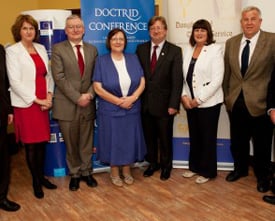
(L to R) Michael J. Leahy, director, Office of Rehabilitation and Disability Studies College of Education, Michigan State University; Joan Burton, minister for social protection, Ireland; Oliver Murphy, president, Institute of Technology Tralee, Ireland; Sr. Goretti Butler of the Daughters of Charity of St. Vincent de Paul, Ireland; Prof. Brian Norton, president, Dublin Institute of Technology, Ireland, Máire Geoghegan-Quinn, Ireland commissioner, European Commission, European Union; William McIlvane; Brian Harvey, professor of molecular medicine, Royal College of Surgeons, Ireland.
UMass Medical School is one of two American universities to serve as a host institution for a European-Union-funded research program focused on developing new technologies to help individuals with autism spectrum disorders and intellectual disability.
The Eunice Kennedy Shriver Center, a unit of UMass Medical School’s Commonwealth Medicine division, is partnering with the European Union Marie Curie ASSISTID (Assistive Technologies for People with Autism and Intellectual Disability) Cofund program on the recently launched project. The program, which has committed $12 million over the next five years, is co-funded by the European Commission and the DOCTRID (Daughters of Charity-Technology, Research into Disability) Research Institute in Ireland.
“There is value in international collaboration for a variety of reasons,” said Commonwealth Medicine Director of Academic Development William McIlvane, PhD. “First, it aligns with the medical school’s mission to advance research through partnership. Second, it allows us to develop relationships with scholars across the globe whose work may influence our own research.”
Dr. McIlvane and Alexandra Bonardi, MHA, OTR/L, director of the Center for Developmental Disabilities Evaluation and Research at the Shriver Center, traveled to Dublin, Ireland, in May to participate in the official launch of the program. Ireland’s EU Commissioner Máire Geoghegan-Quinn announced the program at the Daughters of Charity Disability Services in Dublin.
“It’s a very exciting thing to see such a large research center fund research for assistive technology,” Bonardi said. “As an organization with more than 40 years of history focusing on making the lives of people with intellectual disability better, the Shriver Center and its staff will offer specialized knowledge and expertise to fellows participating in the program.”
Lauded as the first of its kind in Europe, the program will concentrate on research in the area of assistive technology, which are tools used to improve the functional capabilities of individuals with disabilities. Assistive technology could include hardware like speech devices that help non-verbal individuals communicate or computer software to improve learning or facial recognition.
“We want to be engaging in the global community that’s working on these issues,” said Bonardi, who believes the multidisciplinary fellowship could open up opportunities for collaboration between the five UMass campuses.
The $12 million will fund the research of 40 postdoctoral fellows, with the first cohort to be selected in the fall of 2014 and begin in February 2015. Fellows, who will select their host institution, can devote their research to any field of study as long as there is a link to autism or intellectual disability. UMass Medical School would serve as a host institution if selected by researchers. Michigan State University is the only other American institution that will serve as a research program host.
Founded in 1970, the Shriver Center, through research, training, and education, is dedicated to understanding and improving the challenges faced by individuals with intellectual and developmental disabilities and their families. Among its work is developing new computer software to help children with autism spectrum disorders improve their communication skills and become stronger learners.
“Given UMass Medical School’s interest in assistive technology, we were a natural partner with them and they were a natural partner with us,” McIlvane said.